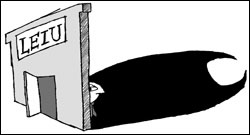Welcome to the 48th annual Training Seminar of the Law Enforcement Intelligence Unit (LEIU), a roving event coming this year to Seattle on June 2-5. The theme of this year’s sold-out private conference: “Criminal Intelligence and the War on Terror.” Be very afraid. Or annoyed, depending on which side you’re on.
At first glance, the LEIU’s gathering looks like any of the dozens of trade shows and conferences that enable America’s professionals to enjoy a tax-deductible, or taxpayer-paid, few days of Northwest summer. This one happens to involve a trade association for cops. But hey, you want your public officials to be up on the latest trends, too, right?
Well, maybe. The problem with the LEIU seminarand the reason the Internet is buzzing about planned protests, particularly among folks who’ve cut their teeth protesting wars and the WTOis that the LEIU might be very ordinary or very, very sinister or both, and there’s no way to tell. The Law Enforcement Intelligence Unit is a private entity whose dues- paying members are hundreds of North American law enforcement agencies. Its founding purpose, in the Cold War atmosphere of 1956, was “to promote the gathering, recording, and exchange of confidential information not available through normal police channels, concerning organized crime.”
Formed in california, LEIU’s roster of interests, and LEIU itself, steadily expanded in subsequent years, especially under Gov. Ronald Reagan and his executive assistant, Edwin Meese. It received some attention in the 1970s in conjunction with General Accounting Office and congressional investigations, including that of the federal COINTELPRO program that sought to “neutralize” black, anti-war, and other radical political movements hated by J. Edgar. Various local scandals around the country linked LEIU efforts with police departments spying on dissidents. LEIU’s prime purpose, critics charged, was to enable cops to not only swap information but to get around local laws against such practices.
Because LEIU was, and is, a private organizationeven though publicly funded law-enforcement agencies funded itLEIU didn’t need to tell anyone what it was doing.
It still doesn’t. Search for “Law Enforcement Intelligence Unit” on any engine and you’ll find four types of hits: law- enforcement agency budget line items for dues; historical information from 30 and more years ago; conspiracy theorists; and calls to come protest this June in Seattle.
What’s missing, remarkably, is virtually anything on what LEIU is up to today, or has done in the past quarter-century. A search of newspaper databases is similarly barren. Add in the post-9/11 USA Patriot Act, proposed Patriot II, new domestic roles for the Pentagon and CIA, and new Ashcroft regulations encouraging federal, state, and local agencies to investigate political and religious groups with or without reasonable suspicion of criminal wrongdoing, and LEIU’s annual trainingwith or without invited keynoter Tom Ridgeis attracting, perhaps for the first time, efforts to organize major protests.
And generating not a little bit of paranoia. In the complete absence of known abuses, protest calls are throwing around terms like “police state” with remarkable ease.
But, as the saying goes, just because you’re paranoid doesn’t mean they’re not out to get you. The brief ’70s exposure of LEIU turned up a maze of interagency connections and cushy contracts among various semiprivate, private, and extremely private outfits. They either served various functions in the endless bureaucracies of law enforcement or composed the shadowy underbelly of American fascism, depending on the source. Conspiracy- mongers love this stuff. And some of the protest hype, too, is beyond exaggerated or inaccurate. It’s embarrassing.
However, thoughtful activists, people concerned about civil liberties, and those who care about the Constitution should want groups like LEIU to have greater transparency, too. We should be alarmed at provisions like those in Patriot II that would supersede and overturn any state or local restrictions on domestic spyingon anyone, anywhere, for any reason so long as investigators think it might be related to terrorism, as defined by the investigator. That’s a whole lot of latitude to give to a hugely powerful law-enforcement and judicial apparatus, especially when it involves outfits with zero public accountability.
The leiu has no apparent office or Web site of its own and seems to go far, far out of its way to avoid public awareness. That doesn’t serve the interests either of the public or of police agencieslike this seminar’s hosts, the Seattle Police Department and the King County Sheriff’s Officewho have legitimate needs to trade information on suspects and update themselves on new laws and technologies. Those sorts of legitimate needs don’t need to be hidden from the public. And that public needs to have confidence that “criminal intelligence” is, in fact, limited to relevant information gathered on genuinely suspected criminals. Anything else, and the activists and conspiracy-mongers aren’t the only ones who should be concerned.








